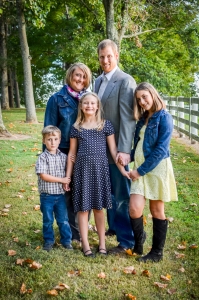Last week I shared a blog entitled “Parents, It’s not ‘your’ job to disciple children.” I picked the title on purpose, hoping it would lead people to question why I would say something like that, and proceed to read the article. Many did in fact do that and I received a lot of feedback, ranging from enthusiastic agreement to sharp disagreement. The conversations surrounding the post led to some robust discussions about the role of the church in discipleship and how that should look in healthy faith communities.
One thing we could all agree on was the fact that parents are the single greatest influence on their children and that the home is the primary place of faith formation. Study after study reveals to us this truth. Parents and caregivers help shape the worldview of their children more than anything or anyone else including church, school, peers and sports. In fact, the second greatest influence are grandparents so that places all of those other influences in a distant third (Want to read more about this, click here).
So, how in the world can I write a post saying that it’s not the parent’s job to disciple children?
Well, first of all, that was not what the post said; rather my heart was to share that discipleship wasn’t exclusively the job of parents and caregivers but something God has called the whole body of Christ to. However, all this talk about influence got me thinking: If parents/caregivers have the greatest influence on their children, who has the greatest influence on them?
Who is influencing the influencers?
It’s an important question to ask, because whoever is influencing the parents is indirectly influencing the children. Wherever the parents are going to get advice, to find support, to resource information and to understand society is the place that wields tremendous influence over children.
Which is why I wrote that post. It’s also why I struggle with the message we often share that says church gets 40 hours a year, schools get 1,200 and parents get 3,000 and therefore parents have the responsibility to disciple their kids; and they do, but they are not meant to do it alone.
We keep saying that church isn’t a building, it’s a community, but when we consistently and often exclusively share messages like this one, we reinforce that idea that church is a place we go 40 times a year for an hour at a time.
We can’t have it both ways.
If church is a community of faith committed to doing life together, then church should be in the schools, the homes, the playgrounds, the neighborhoods, the restaurants, the grocery stores, the soccer fields, etc. Parents are the greatest influence; every study, secular or religious, shows us this. But limiting the church’s influence to only 40 hours a year says that church is nothing more than a building we go to once a week and the faith community is just the pastoral staff and volunteers that interact with our kids on that day?
What if the church was the greatest influence on parents/caregivers?
The influence of an involved and present faith community that prays for each other, interacts with each other, and disciples and mentors each other far beyond set meeting times of “church” can’t be measured by hours. And the support that the parents would feel from knowing they have this spiritual community surrounding them and joining them in the job of raising the next generation would be palpable.
So, who is influencing parents?
 According to Pew Research, parents use social media heavily to find the advice, support, resources and understanding mentioned above. 74% of parents use social media to get support from their friends there. Social media is broadly viewed as a source of useful information and as a parenting tool, with mothers using it as a parenting resource slightly more often than fathers. 59% of those surveyed said they had gotten parenting advice off of social media in the last 30 days. And you know what is really interesting about this? Of their friends on Facebook, parents only qualified 50 of them as “actual” friends.
According to Pew Research, parents use social media heavily to find the advice, support, resources and understanding mentioned above. 74% of parents use social media to get support from their friends there. Social media is broadly viewed as a source of useful information and as a parenting tool, with mothers using it as a parenting resource slightly more often than fathers. 59% of those surveyed said they had gotten parenting advice off of social media in the last 30 days. And you know what is really interesting about this? Of their friends on Facebook, parents only qualified 50 of them as “actual” friends.
That’s a lot of influence for people not even considered actual friends.
I truly believe the church can fill that gap. In fact, I think the church is supposed to fill that gap. I think church can be more. I think God meant it to be more. And I think as children and family ministers we have the awesome job of bringing that vision to the forefront in our church
I’d love to hear from you. How is your church doing this? How is the faith community coming together in ways that reach beyond Sunday morning and Wednesday nights and connecting church and home all week long? I know that some churches are doing an amazing job of creating that support network around and for parents and families and I’d love to share that with a wider network. I am hopeful that my next blog post will offer some of those practical suggestions from all of you and from my own experience that will encourage all of us as we lead the next generation together.
We are called together, not apart. We are called in community, not separately.
We are called to be the body of Christ, joined and fitted together. Discipleship of the youngest generations is our job, collectively and individually. Let’s BE the church…together!
For more information about
- Kids in Worship
- Determining which Type of Family Ministry model works best for your church
- Encouraging the continued conversation through Practical Discipleship at Home
- Seminars, Workshops, Coaching
Check out to ReFocus Ministry or “like” our Facebook page. Join our conversation at theReFocus Family and Intergen Ministry group on Facebook.
About the author
 Christina Embree is wife to Pastor Luke, mom to three wonderful kids, and family minister at Nicholasville UMC. She is passionate about seeing churches partnering with families to encourage faith formation at home and equipping parents to disciple their kids in the faith. Currently studying Family, Youth and Children’s Ministry at Wesley Seminary, she also blogs at www.refocusministry.org and is a contributing blogger at D6 Family, Seedbed, and ChildrensMinistryBlog.com.
Christina Embree is wife to Pastor Luke, mom to three wonderful kids, and family minister at Nicholasville UMC. She is passionate about seeing churches partnering with families to encourage faith formation at home and equipping parents to disciple their kids in the faith. Currently studying Family, Youth and Children’s Ministry at Wesley Seminary, she also blogs at www.refocusministry.org and is a contributing blogger at D6 Family, Seedbed, and ChildrensMinistryBlog.com.


278 Comments